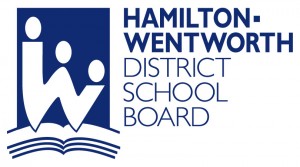
HWDSB Steady on Grade 9 Math Tests
 The Education Quality and Accountability Office (EQAO) today released school and board results for the latest Grade 9 applied and academic math tests.
The Education Quality and Accountability Office (EQAO) today released school and board results for the latest Grade 9 applied and academic math tests.
In 2015, 2,957 Grade 9 students at Hamilton-Wentworth District School Board wrote the Grade 9 math assessment. Results track the percentage of students at or above provincial standard (Levels 3 or 4).
In the latest results, 82% of students in Grade 9 Academic Math were successful, up 1% point from 2013-14; and 40% of students in Grade 9 Applied Math were successful, the same rate as 2013-14.
“Math results are often a challenge in boards across Ontario, so we need to celebrate gains but continue to push hard with our comprehensive math strategy,” Director of Education Manny Figueiredo said. “Our strategy balances skill development and problem solving in math.”
Figueiredo said HWDSB strives for longer-term improvements. Looking at trends since 2010-11, HWDSB students have gained 6% on Applied Math and 3% points on Academic Math.
Both versions of the tests – one for academic and one for applied math courses – evaluate the math skills students are expected to have learned by the end of Grade 9.
With math results often a challenge across the province, HWDSB is encouraged by this year’s results and will continue to pursue gains through the district-wide math strategy.
Results of the tests, developed by Ontario teachers, support planning at the student, school, board and provincial levels. EQAO results are among the many pieces of data that Board educators use to address the learning needs of students.
-30-
About Us
Hamilton-Wentworth District School Board is engaging the community to reimagine its vision and focus. Watch for details as the Board rolls out the Reimagine HWDSB initiative so our community can help us Explore, Imagine and Launch a new direction. Learn more at www.hwdsb.on.ca or follow us on Twitter @hwdsb.
For more information:
Rob Faulkner, Communications Officer
(905) 527-5092 ext. 2377, (905) 906-2007
[email protected]
BACKGROUND
Some themes in this year’s results include:
Board-wide gains through a comprehensive math strategy
In the HWDSB math strategy, math facilitators are working with school math department staff to implement a balanced math program, which focuses on skill acquisition and problem solving. Diagnostics and ongoing assessments are helping teachers know where their students are now, and results help them tailor research-backed strategies to address these gaps. This will involve collaboration among teachers from both the elementary and secondary panels – so that students arriving in Grade 9 are prepared for success.
Some of the evidence-based approaches include: personalized small group instruction, emphasis on skill development and problem solving, the use of technology for learning and using diagnostics and key assessments to understand our students’ learning needs. Technology is a powerful way to make learning more visible, helping students talk about their thinking, and can also help provide online resources for support at school and at home.
Schools embracing innovation for success
At Glendale, the past five years have seen the success rate for Applied Math rise 10% and rise on Academic Math by 16%. Staff say gains are due to the dedicated support for student learning by Grade 9 math teachers, who reinforced essential skills needed for math in life and on tests. In class, specific strategies included extensive use of the three-part lesson, hands-on learning tasks and the use of language supports, originally used for English Language Learners, for all students. These language supports included displaying math-related word definitions on classroom walls, pre-teaching math vocabulary and the use of student glossaries. In addition, staff regularly integrated EQAO-style material into learning tasks and assessments.
At Delta, which was up this year 5% on Applied Math and 23% on Academic Math, school staff credit several factors for their success. Staff cite the importance of the implementation of inquiry-based learning – which encourages students to learn through exploration – as well as a focus on a positive mindset so every student knows they can succeed in math. In class, students are given authentic mathematical tasks that involve math problem solving and conversation. These math conversations even spill into life outside the classroom. Classroom teachers support students with one-to-one help, getting them families with what EQAO tests will look and feel like when they arrive. Students focus on justifying their answers, so they understand how to repeat the results. Delta has also emphasized that they are not learning math for the test but because math is worthwhile, and that the test is a way to evaluation the math program, not students.
Updated on Friday, September 24, 2021.

